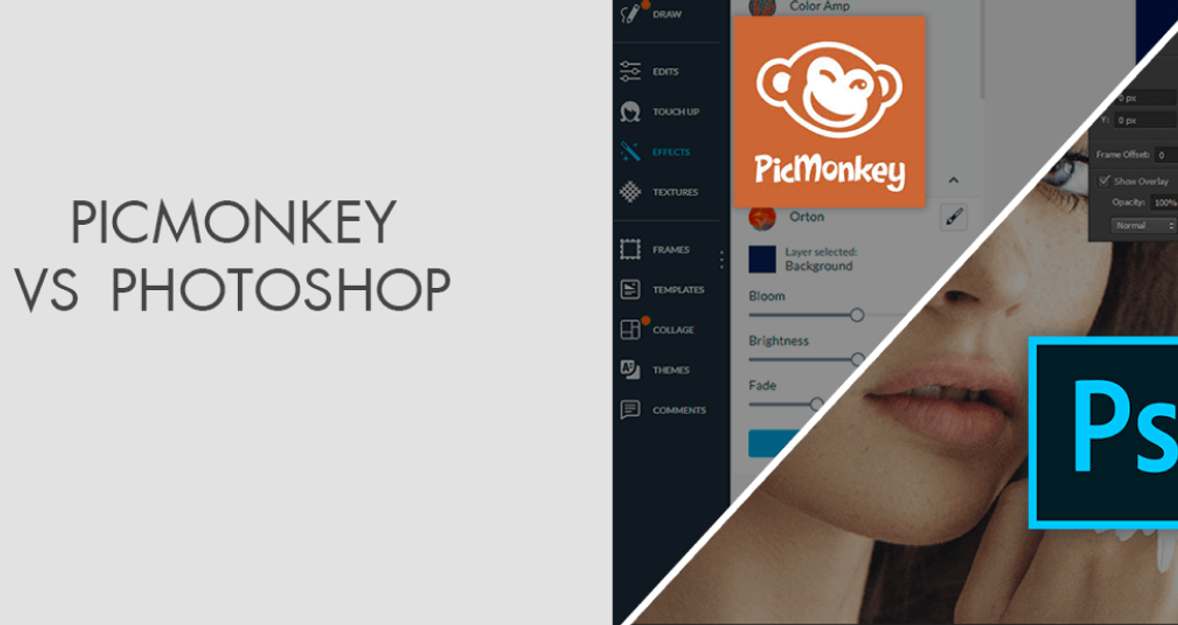PicMonkey vs Photoshop: A Battle of Features and Versatility
August 13, 2025

Compare PicMonkey and Photoshop to see which photo editor fits your needs best. Explore features, flexibility, and creative tools for perfect image editing.
Editing photos has become a routine activity for many, whether it’s adjusting the lighting, removing unwanted objects, or adding some creative flair. Two popular tools for this purpose are PicMonkey and Photoshop. While both offer great features, professionals often seek something that provides more control and flexibility. This guide will explore PicMonkey and Photoshop to help you determine which one suits your needs best.
PicMonkey: A Simple and Quick Online Editor?
 PicMonkey is all about making photo adjustments a breeze, without the hassle of a complicated setup. This online tool is perfect for anyone who needs quick edits without getting lost in tricky menus. It’s super useful for creating visuals for social media, blogs, and promotional content.
PicMonkey is all about making photo adjustments a breeze, without the hassle of a complicated setup. This online tool is perfect for anyone who needs quick edits without getting lost in tricky menus. It’s super useful for creating visuals for social media, blogs, and promotional content.
Some of its standout options:
ready-made templates for different types of posts;
drag-and-drop system for easy adjustments;
tools to smooth skin, brighten eyes, and adjust hair;
a variety of graphics and stickers;
text editing with different fonts;
basic support for multiple layers;
ability to remove backgrounds;
collage maker for combining pictures;
cloud storage and access on mobile devices.
This editor is a solid choice for bloggers, small businesses, and anyone who needs quick and simple photo edits. It’s one of the best apps like PicMonkey on the market. While not made for complex edits, it gets simple jobs done quickly.
Your AI-Powered Photo Editor for MacOS and Windows
Discover Now!Photoshop: A More Detailed Editing Tool
 Adobe Photoshop has long been a favorite for photographers, designers, and artists. It’s packed with tools that allow complete control over images.
Adobe Photoshop has long been a favorite for photographers, designers, and artists. It’s packed with tools that allow complete control over images.
Some of its core functions:
in-depth work with multiple layers;
different blending effects and masking options;
smart objects for flexible editing;
correction tools for fixing details (stamp tool, healing brush);
ways to adjust text and graphics;
automatic processes to speed up work;
support for high-quality RAW image editing;
additional features for 3D and video adjustments.
Photoshop offers incredible editing possibilities, but learning how to use it takes dedication.
Photoshop functions as an AI RAW photo editor using Camera RAW and third-party plug-in support. Learning to master this tool proves challenging.
Serious hobbyists, together with creative agencies and professionals, find Photoshop suitable for their work.
Comparing PicMonkey and Photoshop: Which One Works Best for You?
Photo editing tools are designed for a variety of users, from beginners to professionals. PicMonkey provides a simple and intuitive way to enhance images, making it perfect for quick edits and social media content. Photoshop, on the other hand, offers an extensive set of features that allow for precise adjustments and creative work. Each tool has its strengths, catering to different approaches and needs. The table below outlines the main distinctions between them.
Feature | PicMonkey | Photoshop |
Platform | Web, Desktop, Mobile | Desktop |
Ease of Use | Very Easy | Complex |
Layers | Basic | Expert |
Templates | Many pre-built | Few |
AI Tools | Basic | Some proficient |
Pricing | Subscription | Subscription (more expensive) |
Best For | Beginners, social content | Professionals, graphic designers |
PicMonkey is a great choice for those who want quick and simple edits, making it especially useful for social media content and casual projects. Photoshop, on the other hand, offers extensive tools for professional-level editing, catering to photographers, designers, and artists who need precise control over their work. Both editors serve their purpose well, and the best option depends on the user’s experience level and the type of results they aim to achieve.
AI-Based Tools Changing Editing
 Modern photo editors now include AI-powered tools to make changes faster and easier. Whether fixing lighting or erasing a person from photos, AI features help get things done in seconds.
Modern photo editors now include AI-powered tools to make changes faster and easier. Whether fixing lighting or erasing a person from photos, AI features help get things done in seconds.
Some commonly used AI-powered tools:
automatic corrections;
changing sky elements;
smoothing facial features;
clearing out unwanted objects;
reducing visual noise;
shifting artistic styles;
blurring the background naturally.
These functions are becoming standard in apps like Luminar Neo and ON1 Photo RAW, and even some free alternatives to Photoshop.
Luminar Neo: Smart Editing That’s Easy to Use
 Luminar Neo is one of the most convenient options for those wanting powerful AI-assisted editing. Its design makes editing straightforward, cutting down on the need for complicated settings.
Luminar Neo is one of the most convenient options for those wanting powerful AI-assisted editing. Its design makes editing straightforward, cutting down on the need for complicated settings.
Some notable features:
removing people with one click;
adjusting skies effortlessly;
background blur that looks natural;
fixing lighting issues in a photo;
sharpening details without adding rough textures;
built-in RAW editing features;
layering and masking options for focused adjustments;
special effects and filters for creative looks.
This software makes editing smoother by handling tasks automatically, saving time and effort.
Why Photographers Love Luminar Neo?
A quick look at Luminar Neo's success shows why it’s appealing to users:
simple interface with an easy learning process;
one-time payment option, no need for monthly fees;
AI-powered tools that both beginners and experienced users can benefit from;
works well alongside Lightroom and Photoshop.
This tool sits between the quick features of PicMonkey and the more involved options of Photoshop. It’s a solid pick for those looking for something flexible and capable.
Exclusive Tools of Endless Possibilities in One AI Editor
Explore Now!Choosing the Right Editing Tool

Choosing a photo editor depends on the tasks at hand and how comfortable a person is with editing tools. PicMonkey is a great option for beginners or casual users who want an easy and intuitive way to enhance images. It simplifies the editing process, making it ideal for creating visuals for social media and blogs. The mobile-friendly interface also ensures fast adjustments without extra complications.
Photoshop, on the other hand, is built for those who need complete control over their edits. Its layer-based system allows for precise changes, making it essential for complex photo adjustments and professional projects. With support for plug-ins and advanced tools, it’s well-suited for photographers, designers, and artists who require flexibility and detailed manipulation.
Luminar Neo offers AI-powered tools that make editing smoother and more efficient. This software provides smart features that quickly enhance images without manual adjustments. It operates on a one-time purchase model, appealing to users who prefer avoiding monthly fees while still achieving professional-quality results. Luminar Neo is an excellent choice for those who want to balance simplicity and powerful editing capabilities.
Photo Correction Today: Findings And Summary
Modern photo editing software offers a variety of options for different skill levels and tasks. PicMonkey is great for quick edits and creating social media content with a simple interface. Photoshop is the go-to choice for professionals who need precise control over every detail.
Luminar Neo stands out with AI-powered tools that make editing effortless while still delivering high-quality results. No matter the goal, there’s a tool that fits the job, whether it’s basic touch-ups, advanced editing, or automated enhancements.
Try out different editors and find the one that suits your workflow best! Whether you need quick edits, full creative control, or smart automation, the right software will help bring your images to life.





